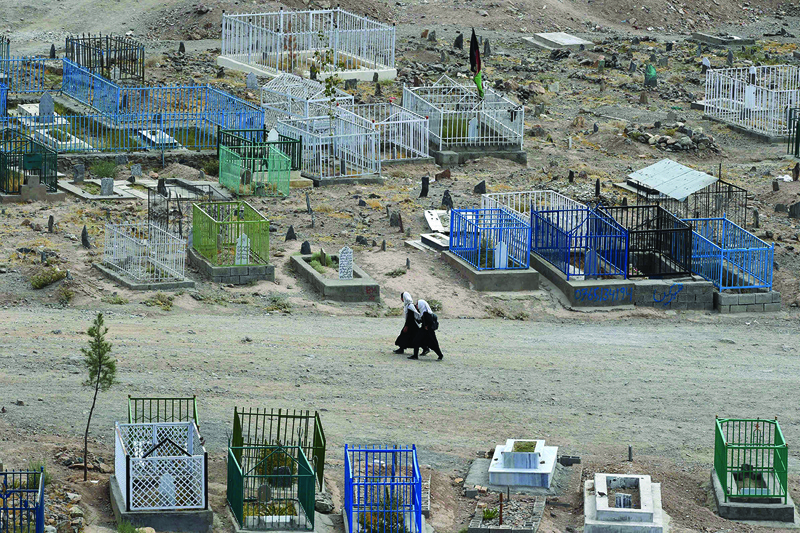 KABUL: Afghan schoolgirls walk through a pathway along the Qasaba cemetery yesterday. - AFP
KABUL: Afghan schoolgirls walk through a pathway along the Qasaba cemetery yesterday. - AFP
KABUL: Afghanistan's beleaguered president vowed yesterday to prevent further bloodshed, as Taleban fighters closed in on Kabul after routing his armed forces over the past 10 days. In a recorded address to the nation - his first since the Taleban launched their sweeping offensive - Ashraf Ghani said he wanted to stop the violence "as a historic mission". "I will not let the imposed war on people cause more deaths," he said, appearing somber and sitting before an Afghan flag.
The president gave no hint he would resign or take responsibility for the calamitous military collapse, but said the armed forces could be "remobilized" and consultations were taking place to try to help end the war. He offered few specifics on what his administration was planning, with government control over Afghanistan all but collapsed, but the presidential palace later said in a statement that "a delegation with authority should soon be appointed by the government and be ready for negotiation".
Ghani's speech came as US Marines were sent in to oversee an evacuation of embassy employees and thousands of Afghans and their families, who fear retribution for working for the United States during its 20-year occupation. With the country's second-and third-largest cities having fallen into Taleban hands, Kabul has effectively become the besieged last stand for government forces who have offered little or no resistance elsewhere.
As the Taleban closed in on Kabul, panicked residents formed long lines outside banks, hoping to withdraw their savings. Some branches appeared to have already run of cash. Insurgent fighters are now camped just 50 km away from Kabul, with the United States and other countries scrambling to airlift their nationals out of the Afghan capital ahead of a feared all-out assault.
Heavy fighting was also reported around Mazar-i-Sharif, an isolated holdout in the north where warlord and former vice president Abdul Rashid Dostum had gathered his virulently anti-Taleban militia. The only other cities of any significance not to be taken yet were Jalalabad, and Khost - Pashtun-dominated and unlikely to offer much resistance.
In Kabul, US embassy staff were ordered to begin shredding and burning sensitive material, as the first American troops from a planned 3,000-strong re-deployment started arriving to secure the airport and oversee evacuations. A host of European countries - including Britain, Germany, Denmark, and Spain-all announced the withdrawal of personnel from their respective embassies on Friday.
For Kabul residents and the tens of thousands who have sought refuge there in recent weeks, the overwhelming mood was one of apprehension and fear. UN Secretary-General Antonio Guterres said he was "deeply disturbed" by accounts of poor treatment of women in areas seized by the Taleban, who imposed an ultra-austere brand of Islam on Afghanistan during their 1996-2001 rule.
Days before a final US withdrawal ordered by President Joe Biden, individual Afghan soldiers, units, and even whole divisions have surrendered - handing the Taleban even more vehicles and military hardware for their lightning advance. The Taleban offensive has accelerated in recent days, with the capture of Herat in the north and, just hours later, the seizure of Kandahar - the group's spiritual heartland in the south.
Asadabad, the capital of Kunar in the east, and Gardez, also fell yesterday, as the Taleban tightened their grip. On Ghani's TV speech, Kabul-based analyst Sayed Naser Mosawi said it appeared the president was running out of options. "The president's message was not definitive enough to say he is willing to fight on to the end, but rather to me it sounds that he may be willing to give into some sort of settlement - if that doesn't mean surrender," he added.
Yesterday, helicopters flitted back and forth between Kabul's airport and the vast US diplomatic compound in the heavily fortified Green Zone - 46 years after choppers evacuated Americans from Saigon, signaling the end of the Vietnam War. - FP
.jpg)



